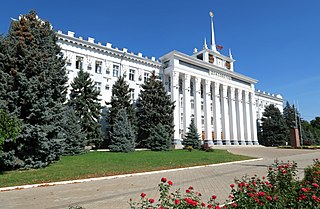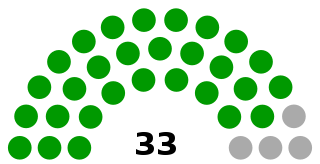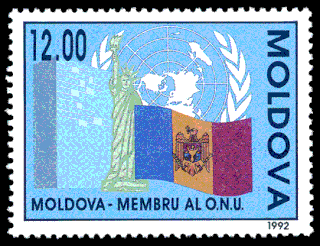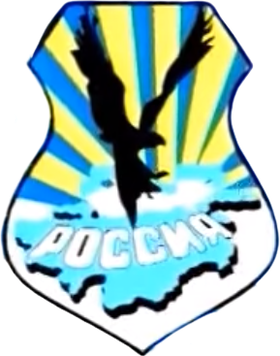
The politics of Moldova take place in a framework of a parliamentary representative democratic republic, wherein the prime minister is the head of the Government of Moldova, and a multi-party system. The President of Moldova has no important powers. The government exercises executive power while the legislative power is vested in the Parliament. The judiciary is independent of the executive and the legislature. The position of the breakaway region of Transnistria, relations with Romania and with Russia, and integration into the EU dominate political discussions.

Tiraspol is the capital and largest city of Transnistria, a breakaway state of Moldova, where it is the third-largest city. The city is located on the eastern bank of the Dniester River. Tiraspol is a regional hub of culture, economy, tourism, and light industry, such as furniture and electrical goods production.

Transnistria, officially known as the Pridnestrovian Moldavian Republic and locally as Pridnestrovie, is a breakaway state internationally recognized as part of Moldova. It controls most of the narrow strip of land between the Dniester river and the Moldova–Ukraine border, as well as some land on the other side of the river's bank. Its capital and largest city is Tiraspol. Transnistria is officially designated by the Republic of Moldova as the Administrative-Territorial Units of the Left Bank of the Dniester or as Stînga Nistrului.

Vladimir Volfovich Zhirinovsky was a Russian right-wing populist politician and the leader of the Liberal Democratic Party of Russia (LDPR) from its creation in 1992 until his death in 2022. He had been a member of the State Duma since 1993 and leader of the LDPR group in the State Duma from 1993 to 2000, and from 2011 to 2022.

LDPR — Liberal Democratic Party of Russia is a Russian ultranationalist and right-wing populist political party in Russia. It succeeded the Liberal Democratic Party of the Soviet Union (LDPSU) in Russia after the dissolution of the Soviet Union. The party was led by Vladimir Zhirinovsky since its inception until his death in April 2022. Opposing both communism and capitalism of the 1990s, the party scored a major success in the 1993 Duma elections with almost 23% of the vote, giving it 64 seats of the 450 seats in the State Duma. In the 2021 elections, the party received 7.55% of the vote, giving it 21 seats.

Igor Nikolaevich Smirnov is a Russian-born Transnistrian politician who served as the first president (1991–2011) of the internationally unrecognized Pridnestrovian Moldovan Republic.

The politics of Transnistria, an unrecognised de facto state situated de jure within the Republic of Moldova in Eastern Europe, take place in a framework of a semi-presidential republic, whereby the president is head of state and the prime minister is head of government. Executive power is exercised by the government. Legislative power is vested in both the government and parliament. Officially, Transnistria has a multi-party system and a unicameral parliament, called the Supreme Council. The president is elected by popular vote. The latest parliamentary elections were held in November 2020.

Obnovlenie, officially the Republican Party "Obnovlenie", is a political party in the unrecognized state of Transnistria, an entity that is internationally recognized as part of Moldova. It has been the parliamentary majority in the Supreme Council since 2005.

The Supreme Council of the Pridnestrovian Moldavian Republic is the unicameral legislature of the internationally-unrecognised state of Transnistria. It consists of 33 seats, all of which are determined by single mandate constituencies and is headed by a chairman.

This is the history of Transnistria, officially the Pridnestrovian Moldavian Republic (PMR), an unrecognised breakaway state that is internationally recognised as part of Moldova. Transnistria controls most of the narrow strip of land between the Dniester river and the Moldovan–Ukrainian border, as well as some land on the other side of the river's bank.

Roman Ivanovich Khudyakov is a Transnistrian-born Russian politician. On 1 August 2006 he was elected chairman of the Liberal Democratic Party of Transnistria at the party's founding congress.

The following is timeline of the History of independent Moldova which started after the independence of Moldova.

The Liberal Democratic Party of the Soviet Union was a political party in the Soviet Union which preceded the modern-day Liberal Democratic Party of Russia (LDPR), the Liberal Democratic Party of Belarus, the Liberal Democratic Party of Ukraine, and the Liberal Democratic Party of Transnistria.

Yaroslav Yevgenyevich Nilov is a Russian politician and deputy of the State Duma of the Russian Federation. He chairs the State Duma Committee on Labor, Social Policy and Veterans' Affairs. He is a member of the populist Liberal Democratic Party of Russia.
The Vladimir Zhirinovsky 1996 presidential campaign was the election campaign of Liberal Democratic Party leader Vladimir Zhirinovsky in the 1996 election.

Moldova–Transnistria relations are the political and economic relations between the Republic of Moldova and Transnistria, an unrecognized state between the Dniester River and Ukraine. During the dissolution of the Soviet Union, political tensions in the Moldavian Soviet Socialist Republic led to Transnistria declaring independence from Moldova, culminating in the Transnistrian War of 1992. As part of the ceasefire agreement ending the war, a Joint Control Commission composed of Moldovan, Transnistrian, and Russian forces was established to supervise the demilitarized zone which was located in the Transnistrian region. The Joint Control Commission still supervises the zone, and negotiations to resolve the dispute are ongoing. The negotiations are supported by the Russian Federation, Ukraine, the United States, the European Union, and the Organization for Security and Co-operation in Europe (OSCE).

Transnistria and the United States do not have official diplomatic relations as the United States is among the vast majority of countries that does not recognize Transnistria as a sovereign nation and instead recognize the region of Transnistria as part of Moldova.

The government of Transnistria, a breakaway state internationally recognized as part of Moldova, has requested annexation by Russia numerous times. Transnistria is a territory that separated itself from Moldova due to fear of a possible unification of the latter with Romania. This sparked the Transnistria War, in which Russian-backed Transnistria managed to stay separate from Moldova. Despite this, today Transnistria is legally and internationally considered part of Moldova.

Since the outbreak of the Transnistria conflict, there have been efforts and proposals to reincorporate the unrecognized state of Transnistria into Moldova.
The Yushchenko Plan, also referred to as the Ukrainian Plan, was a unsuccessful 2005 plan developed by then-President of Ukraine Viktor Yushchenko and Secretary of the National Security and Defense Council Petro Poroshenko in an effort to bring an end to the Transnistria conflict by peaceful means with the support of Moldova and the Organization for Security and Co-operation in Europe (OSCE).

















